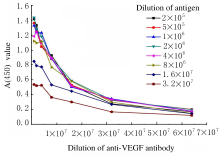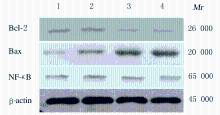| 1 |
HU J, LI G, ZHANG P, et al.A CD44v+ subpopulation of breast cancer stem-like cells with enhanced lung metastasis capacity[J]. Cell Death Dis, 2017, 8(3):e2679.
|
| 2 |
CUSTÓDIO-SANTOS T,VIDEIRA M,BRITO M A.Brain metastasization of breast cancer[J]. Biochim Biophys Acta Rev Cancer, 2017, 1868(1): 132-147.
|
| 3 |
BRAY F, FERLAY J, SOERJOMATARAM I, et al. Global cancer statistics 2018: GLOBOCAN estimates of incidence and mortality worldwide for 36 cancers in 185 countries[J]. CA Cancer J Clin, 2018, 68(6): 394-424.
|
| 4 |
CHEN W, ZHENG R, BAADE P D, et al. Cancer statistics in China, 2015[J]. CA Cancer J Clin, 2016, 66(2):115-132.
|
| 5 |
BOLIS M, GARATTINI E, PARONI G, et al. Network-guided modeling allows tumor-type independent prediction of sensitivity to all-trans-retinoic acid[J]. Ann Oncol, 2017, 28(3) 611-621.
|
| 6 |
FOX S B,GENERALI D G,HARRIS A L.Breast tumour angiogenesis[J]. Breast Cancer Res,2007, 9(6):216.
|
| 7 |
MASI A, LEBOFFE L, DE M E,et al. Retinoic acid receptors: from molecular mechanisms to cancer therapy[J]. Mol Aspects Med,2015, 41:1-115.
|
| 8 |
JUSSILA L , VALTOLA R, PARTANEN T A. et al. Lymphatic endothelium and Kaposi’s sarcoma spindle cells detected by antibodies against the vascular endothelial growth factor receptor-3[J]. Cancer Res,1998,58:1599-1604.
|
| 9 |
SKOBE M,HAWIGHORST T,JACKSON D G,et al.Induction of tumor lymphangiogenesis by VEGF-C promotes breast cancer metastasis[J].Nat Med, 2001,7(2):192-198.
|
| 10 |
KIM, K J, LI B, WINER J, et al. Inhibition of vascular endothelial growth factor induced angiogenesis suppresses tumour growth in vivo[J].Nature,1993, 362(6423): 841-844.
|
| 11 |
XU Q H,SUN T,TIAN H,et al.Ultrasound-mediated vascular endothelial growth factor C(VEGF-C)gene microbubble transfection inhibits growth of MCF-7 breast cancer cells[J].Oncol Res,2013,20(7):297-301.
|
| 12 |
PAPADOPOULOS N, MARTIN J, RUAN Q, et al. Binding and neutralization of vascular endothelial growth factor (VEGF) and related ligands by VEGF Trap,ranibizumab and bevacizumab[J]. Angiogenesis, 2012, 15(2):171-185.
|
| 13 |
VAZIRI S, KIM J, GANAPATHI M K,et al. Vascular endothelial growth factor polymorphisms:role in response and toxicity of tyrosine kinase inhibitors[J]. Curr Oncol Rep, 2010, 12(2):102-108.
|
| 14 |
VISHAL R,SANJAYKUMAR H,SHENHONG W.et al.Treatment-related mortality with bevacizumab in cancer patients[J]. JAMA, 2011,305(5):487-494.
|
| 15 |
董 雪,徐雨昕,郭 晶,等.重组人源抗血管内皮生长因子单克隆抗体的制备及鉴定[J].吉林大学学报(理学版),2019,57(6):1538-1543.
|
| 16 |
薛文潮,李 光,张妮娜,等.全反式维甲酸联合辛二酰苯胺异羟肟酸诱导MCF-7细胞凋亡[J].现代生物医学进展,2016,16(20):3845-3848.
|
| 17 |
LISA R, LINDERHOLM B, NIELSEN N H, et al. Tumor specific VEGF-A and VEGFR2/KDR protein are co-expressed in breast cancer[J]. Breast Cancer Res Treat, 2003, 82(3):147-154.
|
| 18 |
CHEN J Y,LAI Y S,CHU P Y,et al. Cancer-derived VEGF-C increases chemokine production in lymphatic endothelial cells to promote CXCR2-dependent cancer invasion and MDSC recruitment[J]. Cancers,2019,11(8):1120.
|
| 19 |
NAGY J A, VASILE E, FENG D, et al. Vascular permeability factor/vascular endothelial growth factor induces lymphangiogenesis as well as angiogenesis[J]. J Exp Med, 2002, 196(11):1497-1506.
|
| 20 |
YAMADA K, UCHIYAMA A, UEHARA A, et al. MFG-E8 drives melanoma growth by stimulating mesenchymal stromal cell-induced angiogenesis and M2 polarization of tumor-associated macrophages[J]. Cancer Res, 2016 76(14):4283-4292.
|
| 21 |
ZHAO Z,LI Y K,SHUKLA R,et al. Development of a biocompatible copolymer nanocomplex to deliver VEGF siRNA for triple negative breast cancer[J]. Theranostics, 2019, 9(15):4508-4524.
|
| 22 |
HUANG S Y,CHEN Y,LIANG Z M,et al. Targeting pin1 by all-trans retinoic acid (ATRA) overcomes tamoxifen resistance in breast cancer via multifactorial mechanisms.[J]. Front Cell Dev Biol, 2019, 7:322.
|
| 23 |
TERAO M,GORACCI L,CELESTINI V,et al. Role of mitochondria and cardiolipins in growth inhibition of breast cancer cells by retinoic acid.[J]. J Exp Clin Cancer Res, 2019, 38:496.
|
| 24 |
HUANG T Y, PENG S F, HUANG Y P,et al. Combinational treatment of all-trans retinoic acid (ATRA) and bisdemethoxycurcumin (BDMC)-induced apoptosis in liver cancer Hep3B cells[J]. J Food Biochem, 2020,44(2):e13122.
|
| 25 |
李四强, 侯忠赤, 宫 超, 等. 全反式维甲酸对HL-60细胞NF-κB、CyclinD1表达的影响[J]. 中国现代医学杂志, 2006, 16(2):180-182.
|
| 26 |
朱迎萍,吴燕平. 自拟宫颈方对宫颈炎模型大鼠宫颈组织VEGF-A、NF-KB表达的影响[J]. 浙江中西医结合杂志, 2017,27(9):22-25.
|
| 27 |
曹文荣,闫文修,王雪利. 非小细胞肺癌组织中VEGF和Bax的表达及意义[J]. 重庆医学,2016(3):307-309.
|
| 28 |
史爱英.VEGF表达下调抑制人宫颈癌细胞增殖转移相关机制研究[J].中国实验诊断学,2019,23(10):1816-1818.
|
| 29 |
GE Y L, ZHANG X, ZHANG J Y, et al. The mechanisms on apoptosis by inhibiting VEGF expression in human breast cancer cells[J]. Int Immunopharmacol, 2009, 9(4):389-395.
|
 )
)
 )
)






